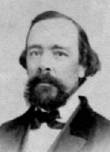 |
| Colonel R. H. Chilton of Lee's Staff |
HEADQUARTERS LIGHT DIVISION,
September 30, 1862.
Colonel R. H. CHILTON, Assistant Adjutant-General:
COLONEL: I have the honor to acknowledge the receipt of my letter requesting a court of inquiry, with the remarks of Major General T. J. Jackson, and the indorsement of the general commanding, crediting the truth of the charges, and refusing the court.
I respectfully say to the general that I deny the truth of every allegation made by Major-General Jackson, and am prepared to prove my denial by any number of honorable men, including members of General Jackson's own staff. If General Jackson had accorded me the courtesy of asking an explanation of each instance of neglect of duty as it occurred, I think that even he would have been satisfied, and the necessity avoided of keeping a black-list against me. It is hardly necessary to remark that these charges made by General Jackson are of a serious character, involving my reputation and standing as an officer commanding a division of this army, and, if true, I should be deprived of the command; if untrue, then censure should be passed upon the officer who abuses his authority to punish, and then sustains his punishment by making loose charges against an officer who has done and is doing his utmost to make his troops efficient.
I again respectfully, reiterate my request for a court of inquiry, to involve the mater of these additional allegations, and ask that a speedy answer be given me.
I am, sir, very respectfully, your obedient servant,
A. P. HILL,
Major-General, Commanding Division.
P. S. - To show the spirit dictating the indorsement of General Jackson, I instance: "Instead of General H. being with his troops, I found him at his headquarters, apparently just up." My headquarters had been at the place General J. Saw me that morning, which was on the road, and not 100 yards from my leading brigade, but, unfortunately for the truth of his conclusions, they were moved the day before. I had breakfasted that morning at 2 o'clock, and, when General J. saw me, had ridden with my escort form my headquarters to where he saw me, some three-fourths of a mile.
[Indorsement.]
HEADQUARTERS VALLEY DISTRICT,
September 30, 1862.
Respectfully forwarded, with the accompanying charge and specifications respecting Major General A. P. Hill's neglect of duty.
They are not forwarded because I deem a judicial investigation of his conduct necessary, but it appears proper that as I arrested him for neglect of duty, and he insists upon having his case investigated, that I should forward the charge and specifications, so as to enable the commanding general to order a general court-martial for the investigation, should the interest of the public service so require. In regard to General Hill's statement respecting my not asking an explanation of each individual instance of neglect of duty, I would state that I spoke to him about the first neglect, and he did not give a satisfactory explanation. He had ample opportunity of knowing his neglect of duty. When an officer disobeyed or disregards a known order, it is his duty to report is at once, with his explanation, without waiting to be called upon in each individual instance.
No black-list has been kept against General Hill. The specifications only extend over a period of about four weeks, and are of such a character as would not readily escape the memory. With regard to my statement that "instead of General H. being with his troops, I found him at his headquarters, apparently just up," I would only say, that, as one of my division commanders, I must regard his headquarters as remaining at the same place as established until there is some reason to believe that they have been changed. He admits that his headquarters had been where I saw him, and as he gave me no notice of his havingc hanged them, as he should have done, I regard it as another instance of his neglecting his duty. The want of activity about his headquarters, and other circumstances, impressed me with the opinion that he was just up.
T. J. JACKSON,
Major-General.
Series I., Vol. 19, Part 2, Page 731.
Jackson had arrested Hill as a result of his failure to have his troops up promptly and on the road during the Second Manassas campaign. He did not charge him, believing the arrest itself a proper rebuke. In the aftermath of Antietam, where Hill's troops rescued the day for Lee's Army, Hill still nursed a grudge in the matter and likely felt it was a good time to press his points against Jackson. Although Lee attempted to defuse the matter with his normal tact, the matter was never resolved to Hill or Jackson's satisfaction. Neither man was compromising in their natures, and it is worth noting that Hill came to Jackson's command as a result of his inability to work with Longstreet.
No comments:
Post a Comment